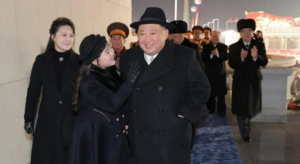A North Korean propaganda song praising Kim Jong Un as “a great leader and a friendly parent” has gone viral on TikTok, prompting South Korea to ban the tune due to its potential for “psychological warfare.” The song, titled “Friendly Father,” has racked up millions of views through mashups and dances, raising concerns in Seoul.

The Rise of “Friendly Father” on TikTok
The song “Friendly Father” was first introduced during a nighttime concert in April, celebrating a housing project in Pyongyang, according to North Korean state media. The lyrics extol Kim Jong Un, the third-generation leader of North Korea, and the accompanying music video shows enthusiastic North Koreans singing praises to their leader.
What sets this propaganda piece apart is its dissemination on TikTok, owned by the Chinese tech giant ByteDance. The song gained global traction as content creators made their own versions of the video, adding dances and humorous captions. These user-generated clips quickly garnered over 2 million views.
South Korea’s Response
Despite its viral success, South Korea viewed the song’s spread as a threat. On Monday, the Korea Communications Standards Commission announced it would block access to 29 videos of “Friendly Father” on TikTok, following a request from the National Intelligence Service. However, some versions of the song remained accessible on YouTube in South Korea as of Wednesday.
The regulatory body stated that the video is typical content linked to psychological warfare against South Korea, aiming to glorify and idolize Kim Jong Un unilaterally. This reaction is consistent with South Korea’s National Security Act, which restricts access to North Korean government websites and media, preventing exposure to the regime’s propaganda.
Also Read : Putin’s luxury gift to Kim Jong Un raises concerns over UN sanctions
The Impact and Interpretation
While North Korean propaganda is not new, the international spread of “Friendly Father” via TikTok is unusual. Alexandra Leonzini, a Cambridge University scholar studying North Korean music, noted that the viral nature of the song does not indicate support for the regime. Instead, TikTok users are mocking the regime rather than expressing allegiance.
Ha Seung-hee, a visiting professor of North Korea studies at Dongguk University, highlighted that more than 90% of North Korean propaganda songs focus on idolizing the leader. “Friendly Father” is no exception but does show improved production values, indicating a potential new propaganda strategy for North Korea. The regime might leverage the TikTok algorithm to gain unintended attention and may continue to produce similar content in the future.
Historical Context
North and South Korea have been separated since the Korean War ended with an armistice in 1953. Although technically still at war, both governments have expressed the goal of eventual reunification while maintaining a hostile stance toward each other.
In North Korea, millions live under a totalitarian regime that controls nearly all aspects of life, from food rations to job assignments. The regime’s propaganda, including songs like “Friendly Father,” serves to reinforce the idolization of the Kim dynasty, which has ruled for over seven decades.
Conclusion
The viral spread of “Friendly Father” on TikTok underscores the unique challenges of managing digital content in the age of social media. South Korea’s decision to ban the song highlights the ongoing tension between the two Koreas and the significant role propaganda continues to play in their relations. While the song’s global reach may not have been Pyongyang’s intention, it demonstrates the power of modern platforms to amplify even the most unlikely content.